German researchers have found that probiotics can prevent the spread of fungal infections in the gut. Researchers at the Leibniz Institute for Natural Product Research and Infection Biology – Hans Knöll Institute made the discovery.
According to scientists, lactic acid bacteria causes the yeast fungus Candida albicans to change its metabolism, making it less infectious. Researchers also revealed that cells in the intestine promote bacterial growth to protect themselves from the fungus.
“The intestinal cells nourish lactic acid bacteria, which thereby multiply and in turn take nutrients away from the yeast fungus,” says Raquel Alonso-Roman, the study’s first author, in a statement.
Because of this, the yeast is forced to adapt its metabolism, shedding certain characteristics and making it less infectious. Adding probiotics restores a healthy state by creating a balance between yeast, lactic acid bacteria and the rest of the microbiome.
The Candida albicans yeast is usually a benign colonization in the intestine. If it gets out of balance or the immune system is compromised, however, the yeast can dangerously enter the blood stream and make it life-threatening for critical patients in intensive care units.
These type of yeast infections are treated with lactic acid bacteria.
“We already know that lactic acid bacteria in particular can counteract a fungal infection, prevent it or even kill the fungus,” says Bernard Huge, head of the Department of Microbial Pathogenicity Mechanisms. “Our work now addresses the question of ‘how’.”
Mark Gresnigt, junior group leader at the Hans Knöll Institute, says that after using data from previous studies, “our computer models can predict that the lactic acid bacteria would multiply and eventually counteract C. Albicans.”
The lactic acid bacteria began to multiply after researchers added epithelial cells from the gut. They did this after other experiments showed that the bacteria did not multiply in conventional culture media.
Researchers say this is a critical step forward to fighting life-threatening fungal infections.
“We want to find out how probiotics fight infection,” says Hube. “With this knowledge, we may be able to develop measures to prevent the aggressive behavior of the fungus. The idea is to influence the fungus the way probiotics would, without actually using them.”
The study was published in Nature Communications.
